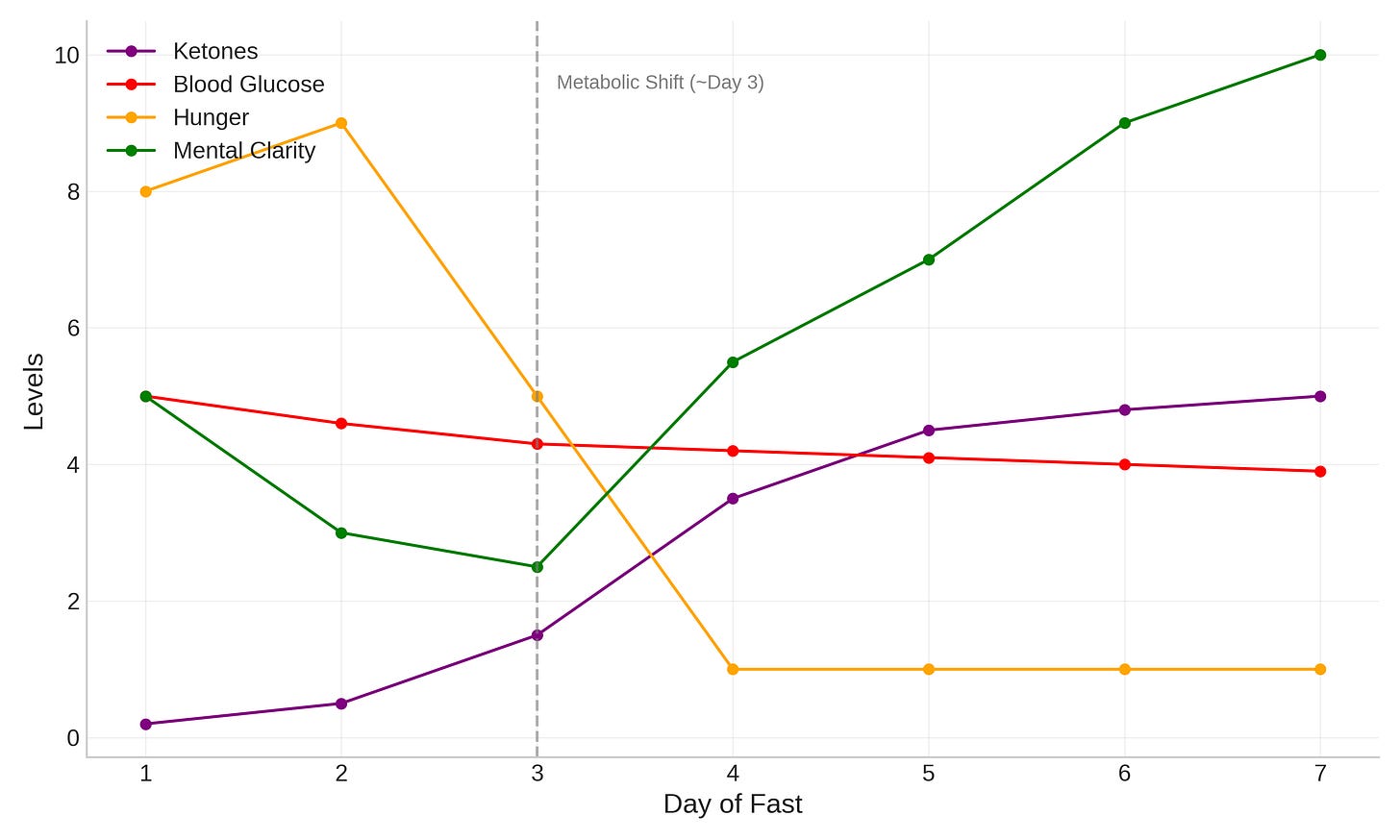On Water Fasting
Lessons from seven days without food
Yom Kippur is approaching again.
As a kid, I fasted on Yom Kippur as a challenge - it was also the only religious practice that kept me connected to Judaism. Standing there with that empty stomach, I’d wonder what would happen if I kept going beyond those 25 hours. Not for religious reasons, but for the pure exploration of the human limits.
Five years ago, I decided to find out. Since then, I’ve completed multiple 7-day water fasts. Each time Yom Kippur comes around, I prefer to extend it into a full week. It’s become an amazing gift I give to my mind and body.
7 Days Without Food?! Why Are You Doing It To Yourself?
My father developed an interest in nutrition in recent years and began experimenting on himself. Water fasting was one of the things he tried, and watching him practice this sparked my curiosity. I decided to try it myself, first under his supervision, and I was hooked.
When I began researching water fasting, I discovered fascinating science. MIT research showed that 24 hours of fasting doubles the regenerative capacity of intestinal stem cells. Valter Longo at USC found that 48-72 hour fasts trigger immune system regeneration. Research shows that a 72-hour fast reduces circulating IGF-1 by 70%, and this growth factor is linked to aging and cancer.
Recent 2024 research from Queen Mary University confirmed something I’d been feeling - the real transformation happens only after 3 days of fasting, when your body undergoes fundamental molecular changes.
But beyond the research, I was curious about my own capacity. What could my body do? What would I discover about myself?
What Actually Happens Each Day
After multiple 7-day fasts, the pattern has become familiar. Here’s a combination of physical and subjective metrics that explain the journey.
Days 1-2
Ketones: 0-0.5 mM | Blood Glucose: 4.5-5 mM → 3.8-4.5 mM | Hunger: 6-8/10 | Mental Clarity: 5/10
Day 1 feels normal - you’re still running on yesterday’s food. Your body is using glycogen from liver and muscle stores. Glucose and insulin levels drop while glucagon and cortisol rise. Hunger hits within a few hours, but it’s mostly a psychological battle.
By Day 2, around hour 36, your glycogen is depleting and your body starts gluconeogenesis - creating glucose from protein and fat. Fatty acids increase in your blood, early ketones appear (around 0.5 mM), and blood sugar drops to 3.8-4.5 mM. The hunger is intense on Day 2, and for most people it’s the hardest day.
After doing this multiple times, my mind now knows what’s happening. The psychological battle has gotten easier, though the physical process remains the same.
Day 3
Ketones: 1-3 mM | Blood Glucose: 3.8-4.2 mM | Hunger: 3-4/10 | Mental Clarity: 8/10
Everything changes on Day 3. Your body switches to fat oxidation as the primary energy source. Ketone levels reach 1-3 mM, and your brain starts using them for fuel. The PDK4 enzyme increases 13-fold to preserve glucose. This is when the multi-organ protein response begins - your entire body is adapting at a cellular level.
The mental clarity that arrives is remarkable. This is when autophagy reaches high levels - your cells literally eat their damaged parts and recycle them.
I plan my most creative work for days 4-6 now. Problems I’ve been stuck on suddenly have solutions.
Days 4-5
Ketones: 4-5 mM | Blood Glucose: 3.5-4.0 mM | Hunger: 1/10 | Mental Clarity: 9/10
By Day 4, hunger completely disappears. Ketones rise to 4-5 mM - deep ketosis. Growth hormone levels spike 5-20 times normal, protecting muscle while your body burns fat. Autophagy markers increase significantly, and your stem cells start activating. Your immune system begins its recycling process.
You feel physically weak but mentally sharp. Climbing stairs requires rest, but thinking has never been clearer. Blood pressure drops significantly - about 11 points systolic.
Days 6-7
Ketones: 4-5 mM | Blood Glucose: 3.5-3.8 mM | Hunger: 0-1/10 | Mental Clarity: 9-10/10
These final days bring deep calm. Ketones stabilize at 4-5 mM. Your body is now getting about 73% of its energy from fat. IGF-1 has dropped by over 60%, and insulin sensitivity improves despite the fasting state. The protein changes throughout your body persist.
I’ve typically lost 5-7 kg by this point. Despite the weight loss, strength is preserved - though you shouldn’t be working out during the fast itself. After breaking the fast and recovering for a few days, you can lift the same weights as before, though endurance activities remain harder for a while longer.
There’s something profound about reaching Day 7. It’s not about proving anything anymore. It’s about experiencing a state of being that our ancestors knew but we’ve forgotten. At this point, you can continue fasting for more days if you like, or transition into a ketogenic diet to maintain the metabolic state while beginning to eat again.
The Essential Protocol - Electrolytes
This part is critical. Without proper electrolyte supplementation, water fasting becomes dangerous. Here’s exactly what I take daily:
Sodium - 2-4g (Pink Himalayan salt)
Potassium - 300-400mg (NoSalt or potassium chloride)
Magnesium - 300-400mg (magnesium glycinate)
I mix these into a glass of water:
1/2 tsp Pink Himalayan salt
1/4 tsp potassium chloride
1/4 tsp magnesium sulfate
I drink this once a day. The taste isn’t pleasant, but your body needs these minerals. When you fast, low insulin causes your kidneys to dump sodium and water. Without replacement, you can’t properly hydrate and risk serious complications.
Breaking the Fast
After 7 days, how you refeed determines whether you benefit or harm yourself. I take 2 days to return to normal eating.
Day 1 post-fast: Start with broth and some soft foods. Small portions - your digestive system needs to wake up slowly. I usually have some diluted juice, broth, maybe a small salad with olive oil.
Day 2: Add more variety but keep portions moderate. Steamed vegetables, eggs, and fruits. Listen to your body.
Day 3: By the third day, you can eat everything normally. Your digestive system is fully back online.
The key is going slow on the first day. Your body needs time to restart digestive processes and restore electrolyte balance.
What I’ve Gained From This Practice
Mental Clarity
The sharpness during and after each fast is incomparable. My thinking becomes clearer, decisions easier, creativity flows. The effect lasts weeks after each fast.
Relationship with Hunger
I now understand the difference between true hunger and psychological appetite. This disassociation from hunger helps me do intermittent fasting easily, resist unhealthy foods when they’re around, and last through long days without being cranky about hunger. After going 7 days without food, the daily fluctuations of hunger seem trivial. I eat when I choose to, not when my body habitually expects it.
Physical Reset
My skin clears completely during each fast. Energy becomes stable - no afternoon crashes. Various minor health issues resolve themselves. Research suggests this is autophagy at work, cells cleaning out damaged components.
Metabolic Benefits The physical transformations are remarkable. Stem cell regeneration doubles after just 24 hours, while prolonged fasting triggers immune system regeneration. Blood pressure drops significantly and insulin sensitivity improves. Growth hormone spikes protect muscle mass while the body efficiently burns fat for fuel.
Mental Resilience
Each fast builds mental strength. There’s power in knowing you can go a week without food and actually feel better in many ways. It changes your perspective on what’s necessary versus what’s comfortable.
The Challenges
Muscle Loss
You do lose muscle mass during a 7-day fast. While research shows your strength is preserved, you lose lean mass - some of it is water and glycogen, but some is actual muscle tissue. It takes time to rebuild after each fast. This is one of the main tradeoffs you need to accept.
Physical Weakness
Days 3-5, you’re weak. Stairs become mountains. But it’s temporary and manageable. I plan my fasts around lighter work schedules.
Social Situations
It’s actually become an interesting topic to discuss. When people find out you’re fasting, they’re fascinated. Then comes the fun game - everyone tests you: “Aren’t you hungry?” “Don’t you want this?” They wave food in front of you, offer you their favorite snacks. It’s playful, and I enjoy it. I simply say “I’m fasting” and most people respect it while being genuinely curious. You can still go to dinners, meetings, social events - you just drink water and have interesting conversations about why you’re doing this.
The Mental Game
Some moments are hard. Day 2 especially. But having done this multiple times, I know what’s coming. The discomfort is temporary, the benefits lasting.
Who This Isn’t For
Extended fasting is dangerous for:
Type 1 diabetics (risk of ketoacidosis)
Pregnant or breastfeeding women
Anyone with eating disorder history
People who are underweight
Those on medications requiring food
Do your own research. Consult medical professionals. What works for my body might not work for yours.
My Current Approach
I do one or two 5-7 day fasts per year, usually timing one with Yom Kippur.
Besides that, I listen more to my body about whether I should really eat. When I get sick and hunger reduces, I fast for about 24 hours to let my body heal.
Practical Insights After 5 Years
Preparation matters. Reduce carbs for 2 days before starting. Your Day 2 will be much easier.
Create structure. Plan what you’ll do each day. Days 4-6 are perfect for creative projects, reading, thinking work.
Track everything. Weight, ketones, blood sugar levels - it gives clarity to where you are in the process. The patterns across multiple fasts teach you about your body.
Exercise helps. Light exercise on Day 1 depletes glycogen faster, making the transition smoother. But keep it gentle. No exercise on the rest of the fast.
Respect your body. If something feels wrong, stop. This isn’t about suffering or proving toughness.
A Deeper Reflection
After 5 years of this practice, I respect fasting as a powerful health tool. More than that, it’s a way of understanding what we’re capable of, of reconnecting with a fundamental human experience our ancestors knew intimately.
Every major religion includes fasting. There’s wisdom in that. We live in abundance, constantly fed, never truly empty. The fast reminds us that we’re stronger than we think, that our bodies are remarkably adaptable, that clarity often comes from constraint rather than consumption.
When I fast for 7 days, I’m not just cleaning my cells or resetting my metabolism. I’m practicing an ancient human skill - the ability to be empty and be okay with it. In our world of constant consumption, that’s become a radical act.
To those fasting this Yom Kippur - צום קל (Tzom kal - easy fast) and גמר חתימה טובה (Gmar chatima tova - may you be sealed in the Book of Life for good).
This is my personal experience with extended water fasting. This is not medical advice. Always consult with healthcare providers before attempting any water fast. Do your own research and listen to your body above all else.




A friend who read this just sent me this: https://www.youtube.com/watch?v=URSvfRHt4Uv0 Awesome illustration.
Really helpful. Love it